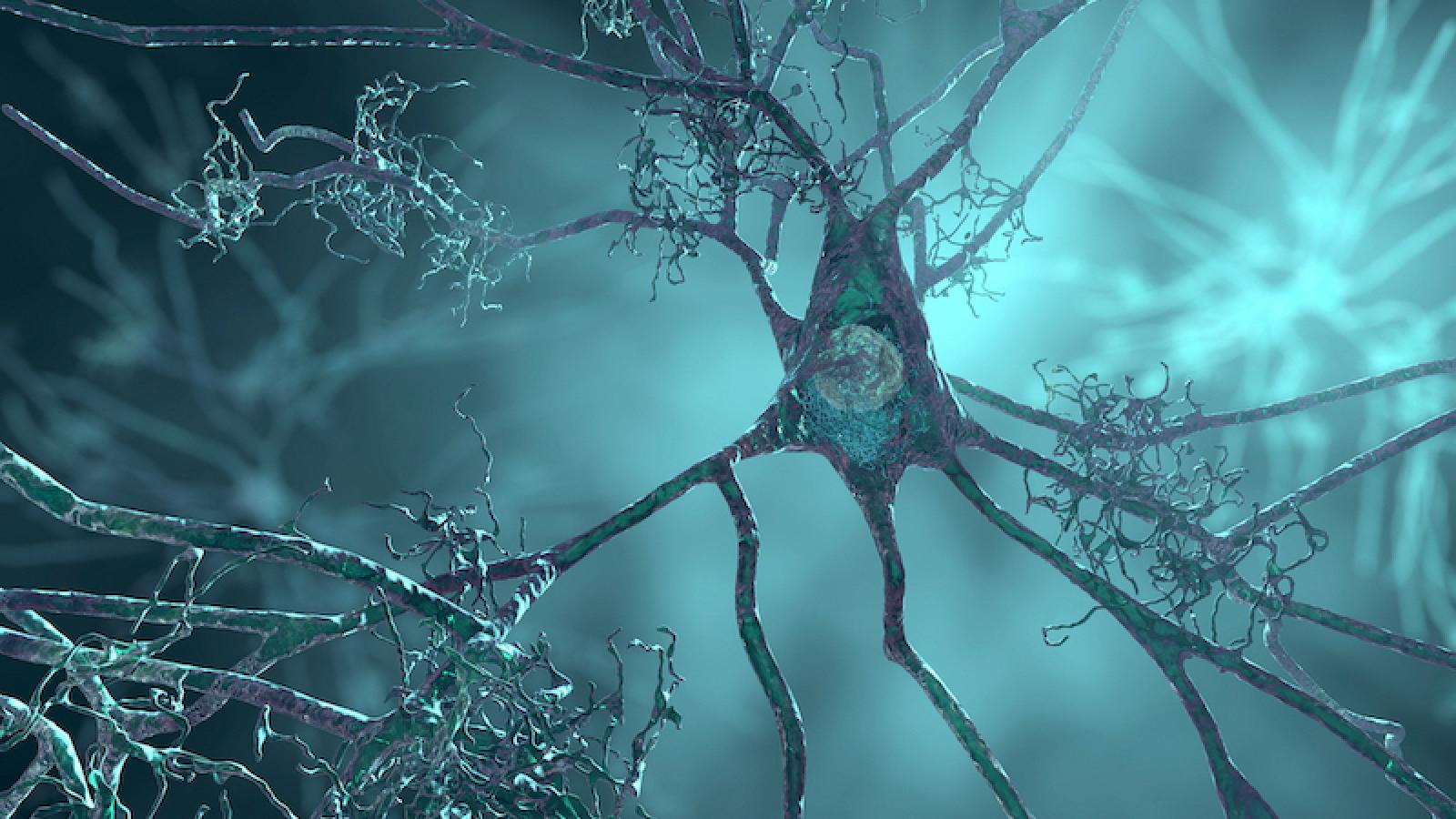Although Alzheimer’s disease is the most common cause of dementia, there are other diseases and conditions that can also lead to dementia. These conditions are rarer and can occur at a younger age. They can also cause symptoms that are not only memory-related. For example, people can experience difficulties with vision, language, movement and behavioural changes.
The charity Rare Dementia Support estimates that around 5%-15% of people living with dementia will receive a diagnosis of a rare, inherited or young onset form of dementia.
At the UK Dementia Research Institute, our ambitious team of experts are at the forefront of emerging research working on the root causes of these conditions. They share insights on commonalities and differences which can lead to crucial information on how to develop treatments.

Rare conditions
- Familial Alzheimer’s (FAD)
Familial Alzheimer’s disease (FAD) is a type of Alzheimer’s that is caused by a single genetic abnormality, with those affected directly inheriting the faulty gene from their parent. It is very rare, affecting fewer than 1 in 100 people who have been diagnosed with Alzheimer’s. It is usually caused by a change in one of three genes: the PSEN-1 gene, the APP gene or the PSEN-2 gene.
Most cases of familial Alzheimer’s (four out of five cases) are caused by a change in the PSEN-1 gene. In these cases, dementia symptoms can begin at as early as 30 years of age.
The symptoms of FAD are usually similar to those that are associated with typical Alzheimer’s disease, with memory loss being the earliest and most prominent symptom in most cases, and with other aspects of thinking becoming affected over time.
The symptoms and challenges associated with FAD have similarities to those associated with Alzheimer’s disease. For this reason, some of the strategies for managing Alzheimer’s are also effective for treating FAD, for example, prescription medication options and holistic therapies such as cognitive stimulation therapy. As people affected with FAD are usually younger and of working age, often with young families, additional factors need to be considered when determining how best to support them moving forwards to optimise their functionality and quality of life.
- Early onset Alzheimer’s
When a person develops dementia before the age of 65, this is known as young or early onset Alzheimer’s. Over 70,800 people in the UK are living with early onset dementia. Alzheimer's disease is the most common type of early onset dementia and may affect around one in three younger people with the condition.
The symptoms of early onset Alzheimer's are similar to those of Alzheimer's disease, and the causes are similar to the diseases that usually cause dementia in older people.
Medication and holistic support such as talking therapies can all make a difference with managing symptoms and living well with the condition. Some younger people may also find counselling beneficial to help with coming to terms with their diagnosis.
- Multiple system atrophy (MSA)
Multiple system atrophy (MSA) is a progressive neurological disorder affecting approximately 4.5 people per 100,000, with around 3,300 people living with MSA in the UK and Ireland at any time. The condition usually starts between ages 50-60 years, though it can affect adults of all ages.
MSA results from degeneration or atrophy (shrinking) of nerve cells in several areas of the brain, including the cerebellum, basal ganglia, and brain stem. Like many other neurodegenerative conditions, there is a build-up of abnormal protein in the brain – in the case of MSA, alpha-synuclein accumulates similar to Lewy body dementia and Parkinson's. Although in MSA, the protein accumulates predominately in cells known as oligodendrocytes which make the fatty, insulating layer wrapped around neurons. We do not know what causes MSA - the disease is not hereditary or infectious, though research is examining potential genetic predispositions.
The symptoms of MSA include problems with mobility and coordination (similar to Parkinson's), blood pressure control issues (particularly drops in blood pressure when standing known as postural hypotension), bladder and bowel difficulties, and impaired speech and swallowing. For men, erectile dysfunction can also be a symptom. The condition progresses differently for each person, but people typically live six to nine years after symptoms begin, though some may live for more than 10 years after diagnosis.
While there is currently no cure for MSA, symptoms can be managed through a combination of medications, specialised equipment, and support from healthcare professionals. Treatment involves a multidisciplinary team approach, including neurologists, physiotherapists, occupational therapists, speech therapists, and specialist nurses.
For more information on MSA and support available, visit The MSA Trust
- Posterior cortical atrophy (PCA)
Also known as PCA, posterior cortical atrophy is a rare form of dementia which can initially cause difficulties with seeing what and where things are. For example, people may experience visual problems when reading or driving; they may also experience issues with judging distances, light sensitivity, recognition and coordination.
PCA usually begins before the age of 65 and people are often in their mid-50s or early 60s when they first experience symptoms. However, the condition can also affect older people.
The symptoms of PCA result from a progressive loss of brain cells in the region of the brain that processes visual information (as opposed to the more common form of Alzheimer’s disease, where it is the parts of the brain that are responsible for memory that are mainly affected).
People living with PCA often preserve their memory and language abilities in the early stages but experience a progressive decline in either their vision or literacy skills (such as their spelling, writing and arithmetic capabilities).
Support aids can help with managing visual loss, such as using talking clocks and watches and making adaptions at home to help make it easier to get around.
- Progressive supranuclear palsy (PSP)
Also known as PSP, progressive supranuclear palsy is a complex neurological condition. It gradually worsens over time due to damage to nerve cells in parts of the brain that control eye movements (supranuclear). It also causes muscle weakness (palsy).
Memory is not often badly affected by PSP, but the condition can cause other cognitive problems such as difficulty with concentration, decision-making, problem-solving, organising and planning.
Around 1 in 10 people who have PSP have symptoms related to thinking and perception when they are diagnosed and around 7 in 10 people who have PSP will go on to develop dementia.
PSP has overlapping symptoms with Parkinson’s disease and can cause similar problems with balance, walking, coordination and eye movements. As many as 60% of people with PSP are initially misdiagnosed, according to the patient support charity the PSP Association.
However, there are some distinguishing features with PSP, such as prominent early backwards falls, a fixed gaze, and more stiffness and slowness. If PSP can be diagnosed at an early stage, this can lead to people receiving more tailored support and symptom management.
Allied health professionals such as occupational therapists and orthoptists can form a key part of treating and managing the condition. For example, they can help with providing advice on falls prevention and fatigue management. They can also recommend exercises that can help with balance and eye movement.
- Primary progressive aphasia (PPA)
Also known as PPA, primary progressive aphasia is a term for a group of dementias that can affect a person’s speech and language. The three most common types of PPA are:
- Nonfluent variant PPA (nfvPPA): This can affect a person’s ability to produce speech, despite retained understanding of the meaning of words. For example, their speech may be slow and effortful, sometimes mixing up sounds (e.g., “m” and “n”), often with errors in grammar.
- Semantic variant PPA (svPPA): This can affect a person’s semantic memory, which stores knowledge that is gained throughout their life such as what objects are and what words mean. Speech is quick and fluent but with an inability to use appropriate words.
- Logopenic variant PPA (lvPPA): This can lead to difficulty with finding the right word, often with long pauses mid-sentence. People also have difficulty repeating back what has just been said to them, although ability to produce speech isn’t otherwise affected.
In PPA, healthy proteins in the brain start to change within cells in areas that control language such as the frontal and temporal lobes. In lvPPA, the proteins involved are the same as in Alzheimer’s disease, whereas svPPA and nfvPPA are considered to be sub-types of frontotemporal dementia.
Strategies for managing PPA include speech and language therapy to help people with their communication difficulties. Speech and language therapists can also provide valuable advice for family and friends and can help by assessing what a person with PPA is able to eat and whether their swallowing is affected by the condition.
- Down syndrome
People with Down syndrome and other learning disabilities are more likely to develop dementia when they are younger. Dementia in people with Down syndrome is almost always caused by Alzheimer’s disease.
The reason for the increased risk of Alzheimer’s is that people with Alzheimer’s disease have an extra chromosome 21, where the APP gene (coding for amyloid) is located, leading to the accumulation of amyloid plaques in the brain.
By the age of 40, most people with Down syndrome will have changes in the frontal lobe of their brain, with most developing dementia in their 50s.
Early signs to look out for include changes in daily living skills, differences in the way they approach daily tasks, and changes to their memory, reasoning or language.
Alzheimer’s Society has produced a useful resource on how to best support someone who has Down syndrome and dementia.
